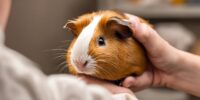When Is Diarrhea a Sign of Serious Health Issues in Guinea Pigs?
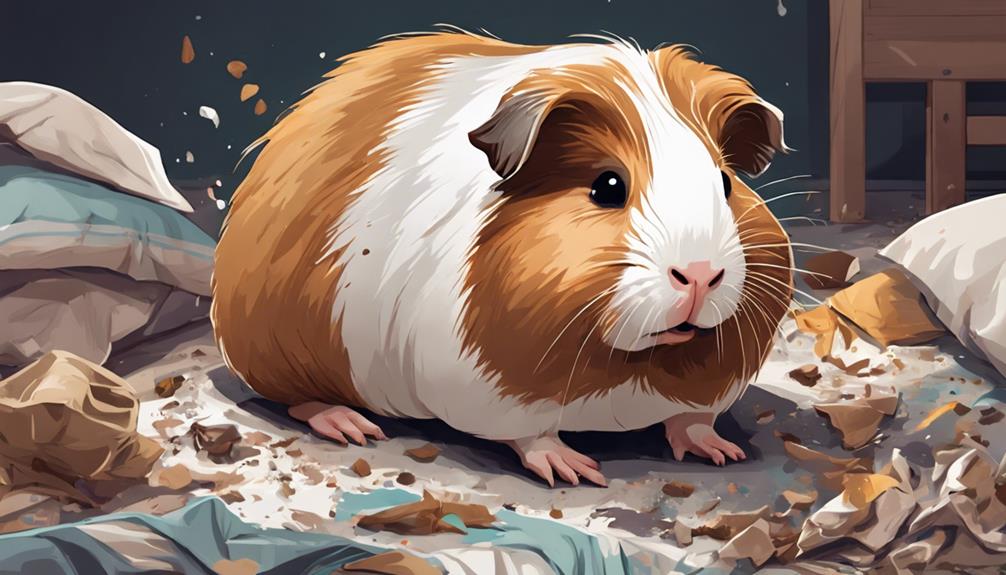
When Is Diarrhea a Sign of Serious Health Issues in Guinea Pigs?
Persistent diarrhea in guinea pigs can indicate underlying health problems that require attention.
Understanding the causes and symptoms is crucial for their well-being.
Key Takeaways
- Changes in guinea pig poop consistency, color, and frequency signal potential health issues.
- Dietary factors like fiber and water intake play a crucial role in preventing diarrhea.
- Infections, including bacterial and viral causes, can lead to severe gastrointestinal problems.
- Parasites such as coccidia, giardia, and roundworms require veterinary intervention for diagnosis and treatment.
Normal Vs. Abnormal Guinea Pig Poop
When evaluating guinea pig poop, it's essential to distinguish between what's considered normal and abnormal feces to monitor their health effectively. Normal guinea pig poop should have a consistent shape and size, typically resembling small, dark pellets. The color may vary from medium to dark brown, depending on their diet. Additionally, normal feces should be passed frequently throughout the day, with a mild odor that isn't overpowering.
On the other hand, abnormal guinea pig poop may present itself in various ways. Changes in poop consistency, such as becoming softer or watery, can indicate underlying health issues. Similarly, alterations in color, like red or black stools, may suggest internal problems that need attention. Moreover, irregular frequency of bowel movements or a particularly foul odor emanating from the feces could be signs of digestive issues or infections that require veterinary care.
Dietary Factors and Diarrhea
Guinea pigs are sensitive creatures, and their digestive systems are no exception. Dietary factors play a vital role in the occurrence of diarrhea in these small animals.
Understanding what causes dietary-related diarrhea and how to prevent it can greatly impact the overall health and well-being of guinea pigs.
Dietary Causes of Diarrhea
Dietary factors play an important role in the development of diarrhea in guinea pigs. Insufficient fiber intake can disrupt their digestive health, leading to loose stools. Guinea pigs are prone to dehydration, especially when their diet lacks proper hydration sources, which can exacerbate diarrhea.
Additionally, vitamin deficiencies, particularly vitamin C, can impact their gastrointestinal function, contributing to digestive issues. It's vital for guinea pig owners to provide a balanced diet rich in fiber and essential nutrients to maintain their pets' overall well-being. By ensuring proper fiber intake, hydration, and essential vitamins, owners can help prevent dietary-related diarrhea in guinea pigs and promote their digestive health.
Preventing Dietary-Related Diarrhea
Insufficient fiber intake can disrupt the digestive health of guinea pigs, potentially leading to loose stools and other related issues. To prevent dietary-related diarrhea in these delicate pets, it is important to provide them with a balanced diet rich in fiber sources. Additionally, ensuring proper hydration is essential for their overall well-being. Here are some hydration tips and fiber sources to help maintain the digestive health of guinea pigs:
| Hydration Tips | Fiber Sources |
|---|---|
| Fresh vegetables | Timothy hay |
| Clean water daily | Oat hay |
| High-water content fruits | Fresh grass |
| Limited sugary treats | Pellets with added fiber |
Infectious Causes to Consider
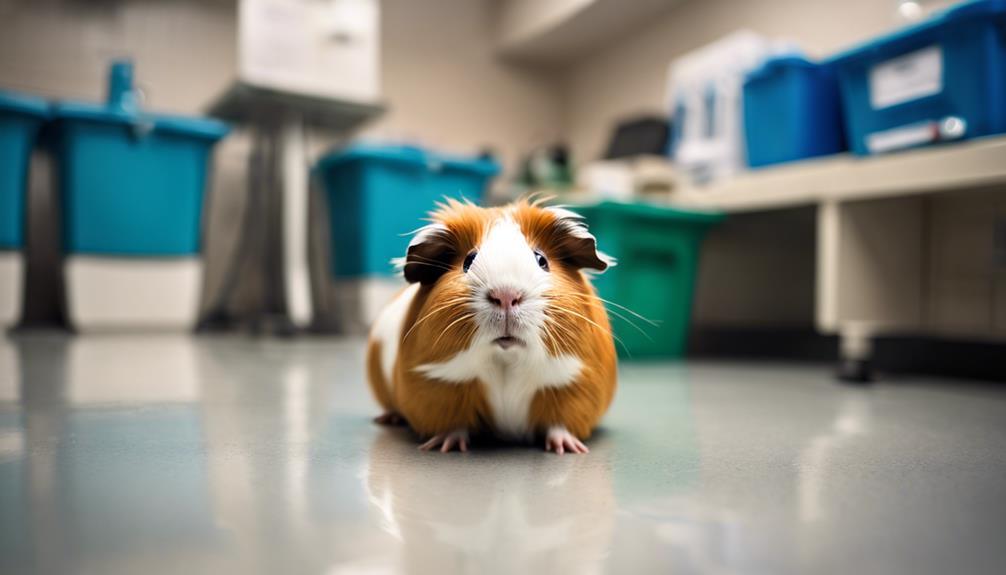
Guinea pig owners must remain vigilant for infectious causes of diarrhea in their pets. Bacterial infections can lead to severe gastrointestinal distress in guinea pigs, warranting prompt veterinary attention.
Understanding viral pathogens is essential for early detection and effective treatment of diarrhea in these small animals.
Bacterial Infections Overview
When considering potential infectious causes of diarrhea in guinea pigs, bacterial infections play a significant role in the spectrum of health issues that need to be addressed promptly and effectively. Antibiotic resistance is a growing concern in bacterial infections in guinea pigs, making treatment challenging.
It's important to maintain the delicate balance of gut flora to support overall intestinal health and prevent bacterial overgrowth. Owners must be vigilant in monitoring their guinea pigs for any signs of bacterial infections, such as changes in stool consistency, lethargy, or decreased appetite.
Prompt veterinary intervention is essential to diagnose the specific bacterial strain causing the infection and determine the most appropriate treatment plan to guarantee the well-being of these beloved pets.
Viral Pathogens Explained
In the domain of guinea pig health, understanding the nuances of viral pathogens becomes paramount when investigating potential infectious causes of diarrhea. Viral infections in guinea pigs can lead to serious health issues and must be carefully considered. Below is a table outlining some key viral pathogens that can affect these small creatures, along with their transmission methods and the immune response they trigger:
| Viral Pathogen | Transmission Methods | Immune Response |
|---|---|---|
| Lymphocytic choriomeningitis virus | Direct contact with infected animals | Cell-mediated immune response |
| Guinea pig cytomegalovirus | Saliva, urine, and respiratory secretions | Humoral immune response |
| Rotavirus | Ingestion of contaminated food or water | Innate immune response followed by adaptive immune response |
Understanding these viral pathogens, their transmission methods, and the immune response they elicit is critical for effective management and treatment strategies.
Parasites and Diarrhea
Parasites can often be a significant underlying cause of diarrhea in guinea pigs, necessitating prompt veterinary attention. Proper identification of parasites is essential for effective treatment. Common parasites that can affect guinea pigs include protozoa like coccidia and giardia, as well as parasitic worms such as roundworms and pinworms. Veterinary professionals may conduct fecal tests to identify the specific parasite causing the diarrhea and tailor treatment accordingly.
Treatment for parasites in guinea pigs typically involves medications prescribed by a veterinarian. These medications are designed to target and eliminate the specific parasite infestation. Additionally, understanding how parasites are transmitted is essential for prevention and management. Maintaining good hygiene practices in the guinea pig's living environment, providing clean bedding, and ensuring a balanced diet can help prevent parasites from infecting these small animals.
Stress-Related Diarrhea
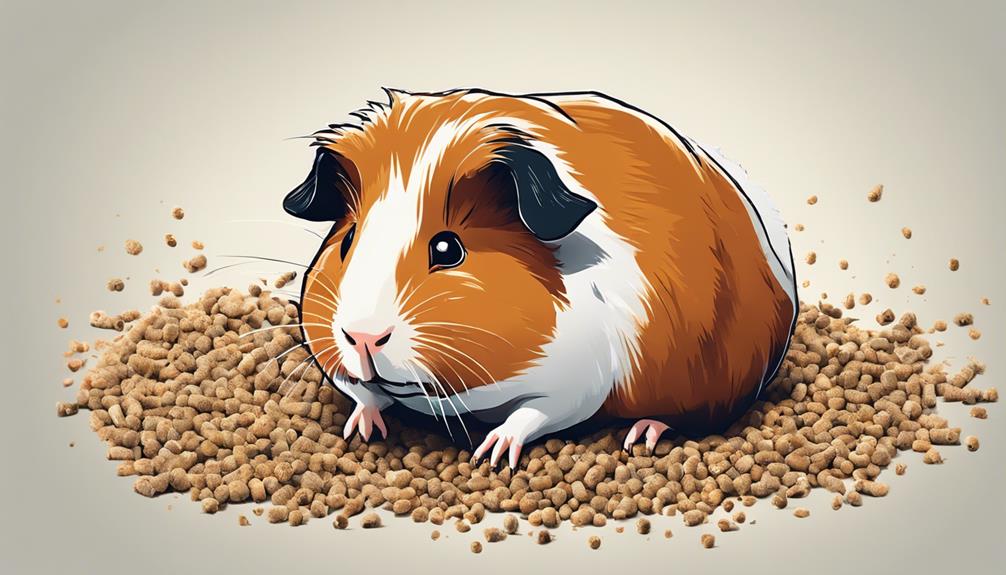
Stress can contribute greatly to the development of diarrhea in guinea pigs, warranting careful attention to their emotional well-being as an important aspect of overall health management. Guinea pigs, being sensitive creatures, are susceptible to stress-induced diarrhea, which can have detrimental effects on their gut health. To guarantee the well-being of these adorable pets, stress management plays a vital role in maintaining their digestive health.
- Comfortable Environment: Providing a safe and comfortable living space can help reduce stress levels in guinea pigs.
- Routine and Stability: Establishing a consistent routine for feeding, playtime, and handling can help minimize stress.
- Enrichment Activities: Offering enrichment activities such as toys and tunnels can keep guinea pigs mentally stimulated, reducing the likelihood of stress-related diarrhea.
Diarrhea as a Symptom of Disease
Diarrhea in guinea pigs can serve as an important indicator of underlying health issues that require urgent attention. When observed, it's essential to contemplate potential disease as the root cause.
Diarrhea isn't a condition to be taken lightly in these delicate creatures, as it can swiftly lead to dehydration, posing significant risks to their well-being. Monitoring their weight and hydration levels becomes paramount during such times, allowing for timely intervention to prevent further complications.
It's essential to approach diarrhea in guinea pigs with a sense of urgency and attentiveness, as it can be a symptom of various diseases that necessitate professional care. Recognizing the signs early and seeking appropriate treatment is key to ensuring the health and longevity of these beloved pets.
Treatment Options for Diarrhea
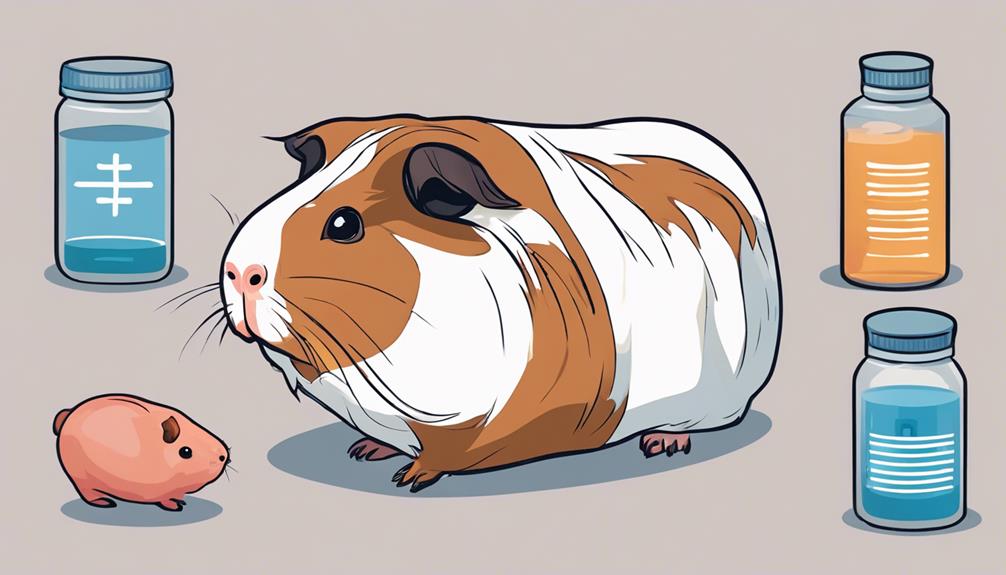
Addressing the underlying causes of gastrointestinal distress in guinea pigs requires a thorough approach that encompasses various treatment options. When dealing with diarrhea in these small pets, it's essential to contemplate the following:
- Medication Side Effects: Be cautious of any adverse reactions your guinea pig may have to prescribed medications. Always monitor their response and consult with a veterinarian if any concerning side effects arise.
- Natural Remedies: Explore natural remedies such as probiotics or specific herbal supplements that can help regulate your guinea pig's digestive system gently. These can often be a safe and effective way to address diarrhea.
- Home Care vs. Veterinary Intervention: While home care like adjusting their diet and ensuring they stay hydrated can be beneficial for mild cases, severe or persistent diarrhea may require prompt veterinary intervention. Don't hesitate to seek professional help when needed to ensure your guinea pig's health and well-being.
When to Seek Veterinary Help
In cases where home remedies fail to alleviate the symptoms, prompt veterinary consultation becomes essential to safeguard the health of your guinea pig.
When faced with persistent diarrhea in your guinea pig despite trying various treatment options at home, it's vital to seek professional veterinary help promptly. Veterinarians possess the expertise and resources to accurately diagnose the underlying cause of the diarrhea and provide appropriate medical interventions.
Monitoring symptoms is important, but if the condition worsens or if additional concerning signs such as lethargy, loss of appetite, or dehydration manifest, immediate veterinary attention is paramount.
Frequently Asked Questions
Can Diarrhea in Guinea Pigs Be Contagious to Other Pets in the Household?
Diarrhea transmission between guinea pigs and other pets in the household is not common. Cross-species infection through diarrhea is unlikely but always best to consult a veterinarian to guarantee the health of all pets.
Are There Any Home Remedies That Can Be Used to Treat Diarrhea in Guinea Pigs?
When a guinea pig has diarrhea, it's essential to address it promptly. Natural remedies like probiotics, dietary adjustments, and ensuring proper hydration levels can aid in resolving the issue. Consulting a vet is advisable for severe cases.
How Long Does It Typically Take for Diarrhea to Resolve in Guinea Pigs With Treatment?
In the domain of guinea pig care, the recovery timeline for diarrhea can vary. However, with proper treatment, this pesky ailment typically bows out within a few days. The effectiveness of treatment plays a vital role in swift recovery.
Are There Any Preventive Measures That Can Be Taken to Reduce the Risk of Diarrhea in Guinea Pigs?
To prevent diarrhea in guinea pigs, it is essential to make dietary modifications, maintain proper hygiene practices, follow vet recommendations, and consider probiotic supplements. These measures can help reduce the risk of gastrointestinal issues in these delicate pets.
Are There Any Long-Term Effects of Repeated Episodes of Diarrhea in Guinea Pigs?
Long term consequences of repeated episodes of diarrhea in guinea pigs can lead to dehydration, malnutrition, and weakened immune systems. It is essential to promptly address any diarrhea in these pets to prevent such issues.

